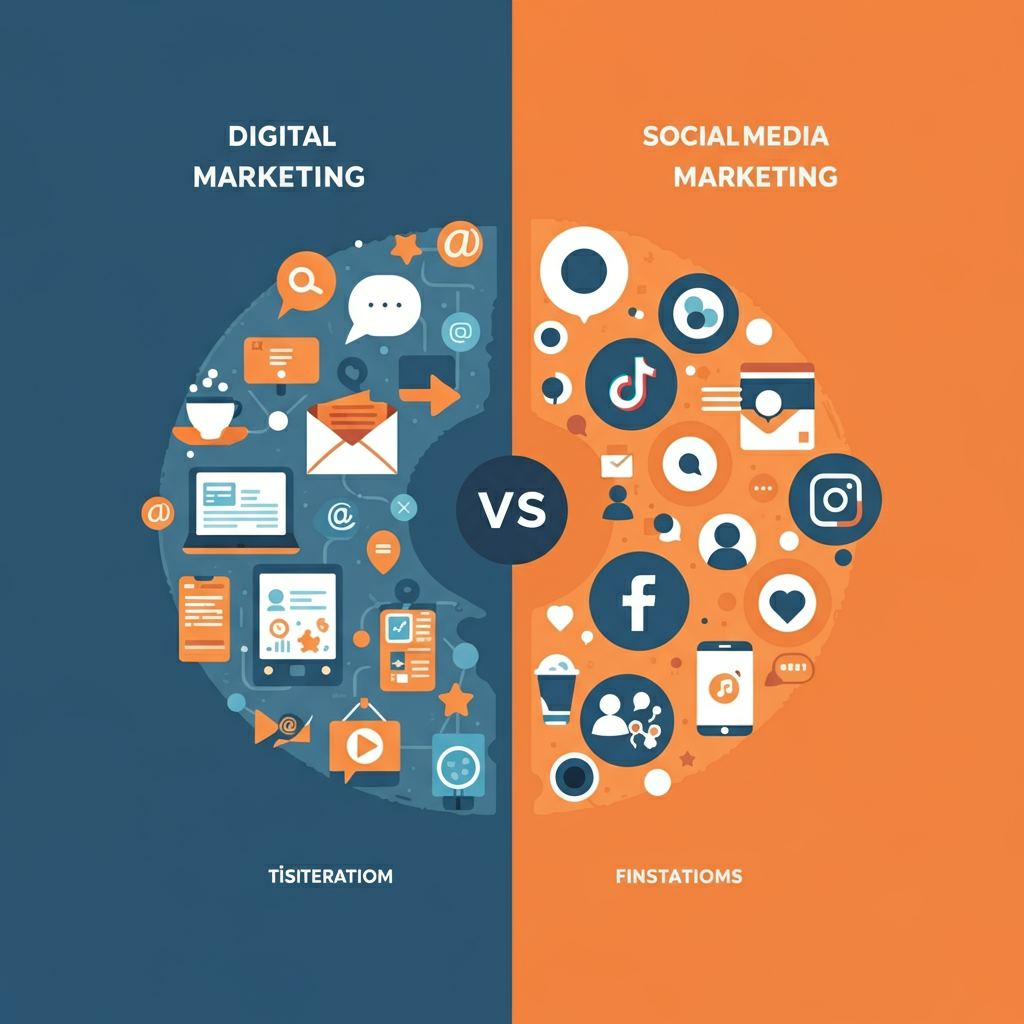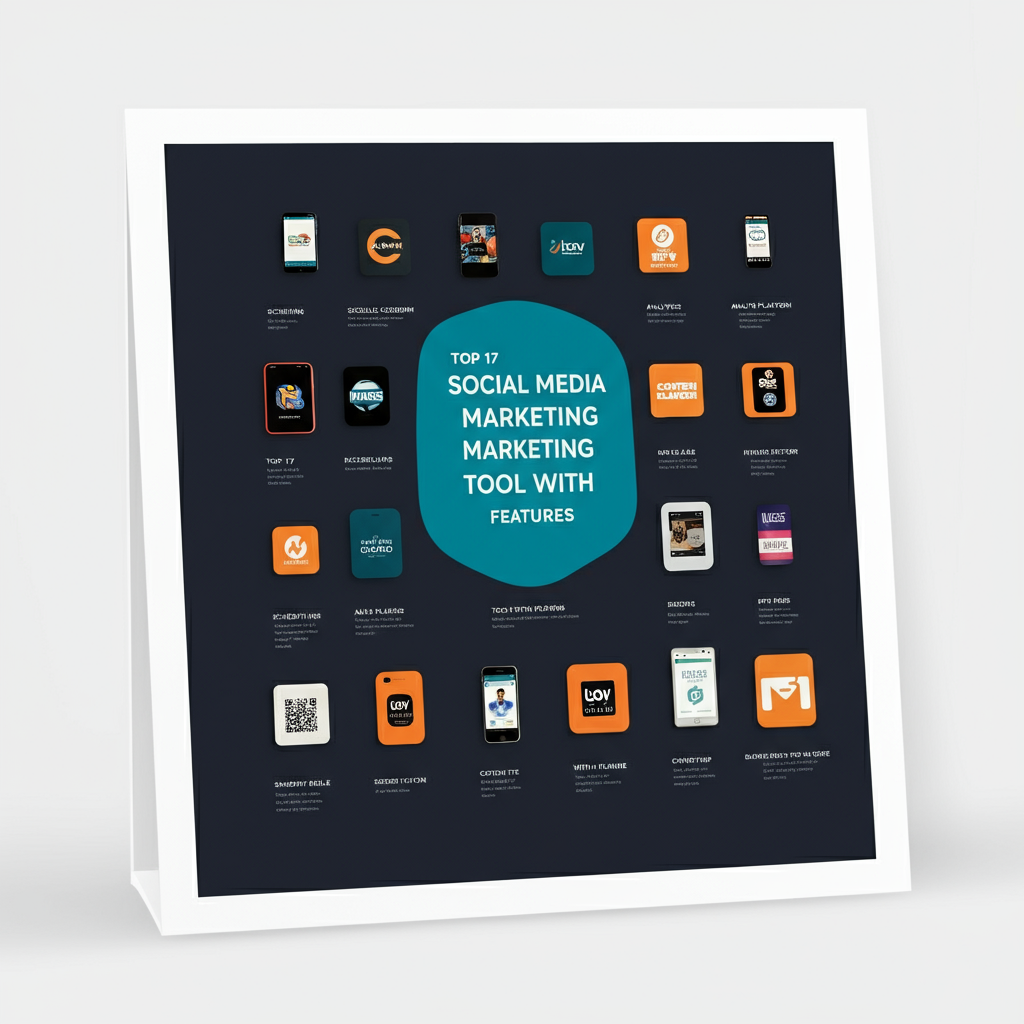Picture this – it’s 2025, and the digital world is more fast-paced than ever. Marketers face new challenges as rapidly evolving technology redefines how brands connect with consumers. Yet, one question remains as integral as ever: What’s the difference between digital marketing and social media marketing, and how do we effectively harness both?
Understanding the distinctions and integrations between these two powerhouse strategies is more critical than ever. Whether you’re a business owner, a marketing professional, a student, or a curious strategist, this guide will help you decode the differences, explore key trends, and prepare your strategies for 2025.
Understanding Digital Marketing
What Is Digital Marketing?
At its core, digital marketing encompasses all online marketing efforts designed to connect a business with its target audience. From search engine optimization (SEO) to email campaigns, digital marketing uses the internet and technology to establish a meaningful presence across various platforms.
Key Components of Digital Marketing
Digital marketing is a broad umbrella containing several crucial components:
- Search Engine Optimization (SEO): Enhancing website visibility organically through search engines.
- Pay-Per-Click Advertising (PPC): Driving traffic through paid ads on platforms like Google or Bing.
- Content Marketing: Creating and sharing valuable content to attract and retain a clearly defined audience.
- Email Marketing: Engaging consumers directly in their inbox to share offers, newsletters, or updates.
- Mobile Marketing: Reaching audiences through SMS, apps, or mobile-friendly websites.
- Affiliate Marketing: Partnering with affiliates to promote your products and drive traffic.
The Scope of Digital Marketing
Digital marketing is all-around versatile. It supports lead generation, conversions, and brand reinforcement, making it indispensable for businesses aiming to grow their online presence in 2025 and beyond.
Understanding Social Media Marketing
What Is Social Media Marketing?
Social media marketing (SMM) is a subset of digital marketing that focuses on turning social platforms into hubs for engaging with existing and potential customers. Platforms like Facebook, Instagram, LinkedIn, and X (formerly Twitter) are leveraged to create interactive and targeted campaigns.
Key Platforms and Features
Each social media platform has unique traits that cater to various marketing needs:
- Facebook: Known for its vast audience reach and advanced ad targeting tools.
- Instagram: Ideal for visually-driven campaigns like product showcases and influencer partnerships.
- X (formerly Twitter): Focuses on real-time conversations and trending topics.
- LinkedIn: Optimized for B2B marketing and professional services.
The Scope of Social Media Marketing
Social media marketing is laser-focused on relationship building. It’s about fostering conversations, creating a community, and enhancing consumer trust. Whether it’s through storytelling, influencer partnerships, or social commerce, SMM is the go-to for creating meaningful connections.
Key Differences Between Digital Marketing and Social Media Marketing

While digital and social media marketing often overlap, they have clear distinctions:
Scope and Objectives
- Digital Marketing: Encompasses all online marketing strategies, including website traffic, e-commerce, and email campaigns.
- Social Media Marketing: Specifically targets social platforms to build brand presence and foster customer relationships.
Strategies and Tactics
- Digital Marketing: A multi-channel approach blending SEO, PPC, and content marketing.
- Social Media Marketing: Focuses on creating shareable, engaging content tailored to social platforms.
Measuring Success
- Digital Marketing: Metrics like click-through rates, conversion rates, and ROI highlight success.
- Social Media Marketing: Engagement metrics (likes, shares, comments) are key indicators of performance.
Integration and Synergy
- Digital Marketing and SMM Together: For maximum impact, brands should run integrated campaigns where social media posts complement PPC ads or email campaigns.
Overlapping Areas and Integration Strategies
The magic happens when you marry digital marketing and social media marketing into a cohesive strategy:
Content Marketing as the Bridge
Creating high-quality content (like blogs or videos) feeds into both strategies, attracting broader audiences while being repurposed for social platforms.
Using SEO for Social Media Visibility
SEO-optimized blog posts can be shared across platforms like Instagram or LinkedIn. Similarly, keywords guide content creation for trending posts.
Email Marketing Integration
Pairing email marketing with social campaigns creates consistency. For instance, a limited-time Facebook ad can link to an email that expands on the offer with personalized discounts.
The Evolution of Marketing in 2025
2025 promises to continue pushing boundaries in both digital and social media marketing:
Trends in Digital Marketing
- AI and Automation: AI tools for predictive analytics, chatbots, and content creation will streamline campaigns.
- Personalization: Tailored marketing messages based on user preferences will be key to engaging audiences.
- Voice Search Optimization: With the rise of smart speakers, optimizing for voice search will be crucial.
Trends in Social Media Marketing
- Influencer Marketing: Influencers will remain a powerful tool for driving social proof.
- Short-Form Video Content: Platforms like TikTok and Instagram Reels will dominate.
- Social Commerce: Expect an increase in in-app purchases on platforms like Facebook and Instagram.
Real-World Examples and Case Studies
Effective Digital Marketing Campaigns
- Amazon’s Recommendation Engine: AI-powered suggestions increase purchase intent and conversions.
- HubSpot’s Content Marketing: Its blogs, eBooks, and tools provide inbound marketing success.
Successful Social Media Marketing Strategies
- Nike’s Instagram Campaigns: Leveraging athletes and motivational content to engage their audience.
- Starbucks User-Generated Content: Fans tag Starbucks in their photos, creating free publicity.
Integrated Campaigns
Coca-Cola’s “Share a Coke” campaign integrated digital ads, hashtag challenges, and personalized bottles, creating a buzz across platforms.
Tips for Success in 2025
To leverage both digital and social media marketing effectively:
- Set Clear Objectives: Define KPIs for both short-term and long-term success.
- Know Your Audience: Use data for personalized campaigns targeting specific demographics.
- Stay Current: Regularly update your strategies based on trends and technology.
- Analyze Continuously: Use tools like Google Analytics and Facebook Insights to optimize campaigns.
Why Digital and Social Media Marketing Integration Matters
The line between digital marketing and social media marketing is increasingly blurred. While they have distinct traits, their intersection offers brands the most impact. By adopting a synergistic approach, companies can connect with audiences across the digital ecosystem seamlessly.
Are you ready to elevate your digital and social media marketing strategies to new heights? The time to act is now.



